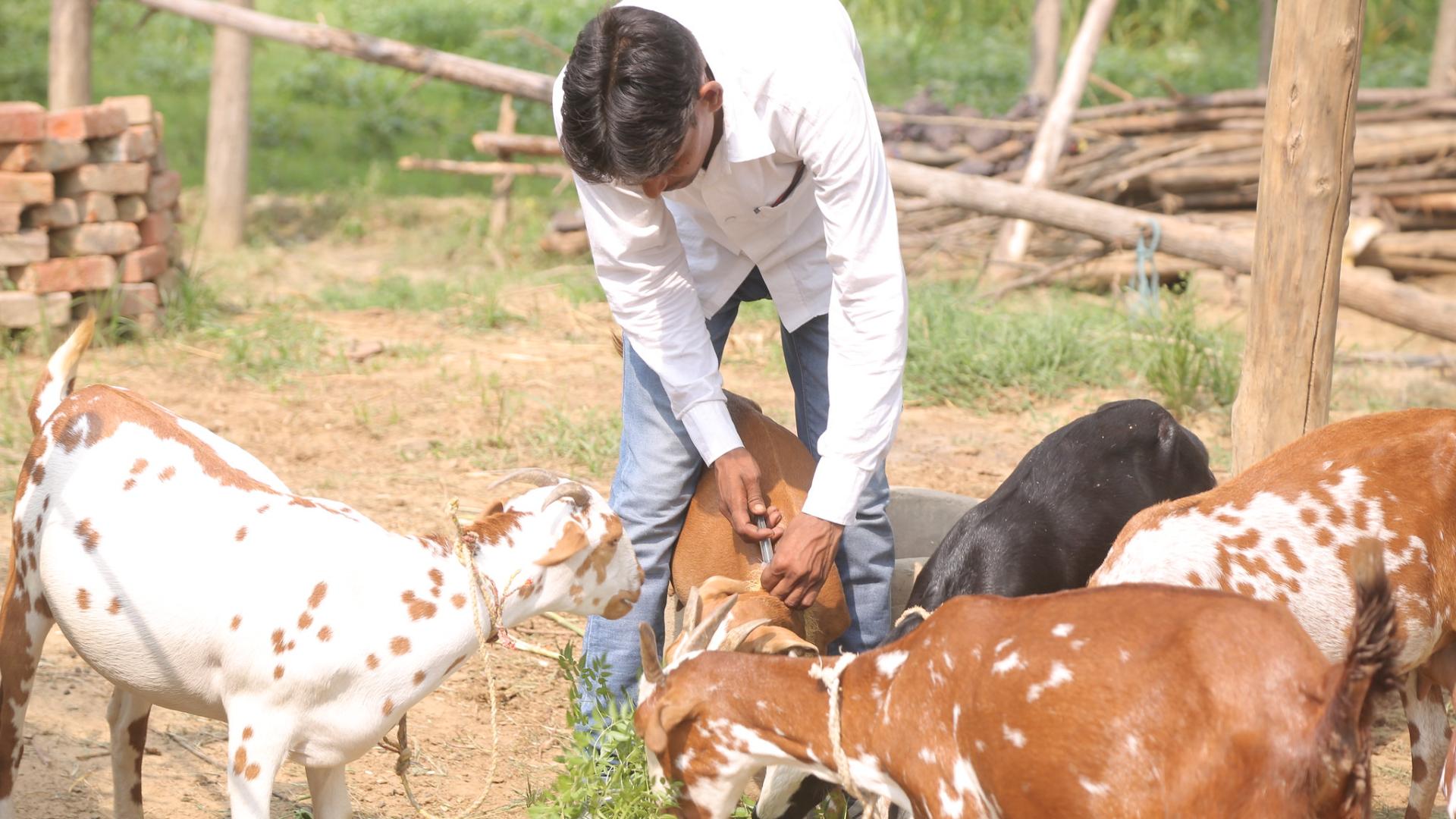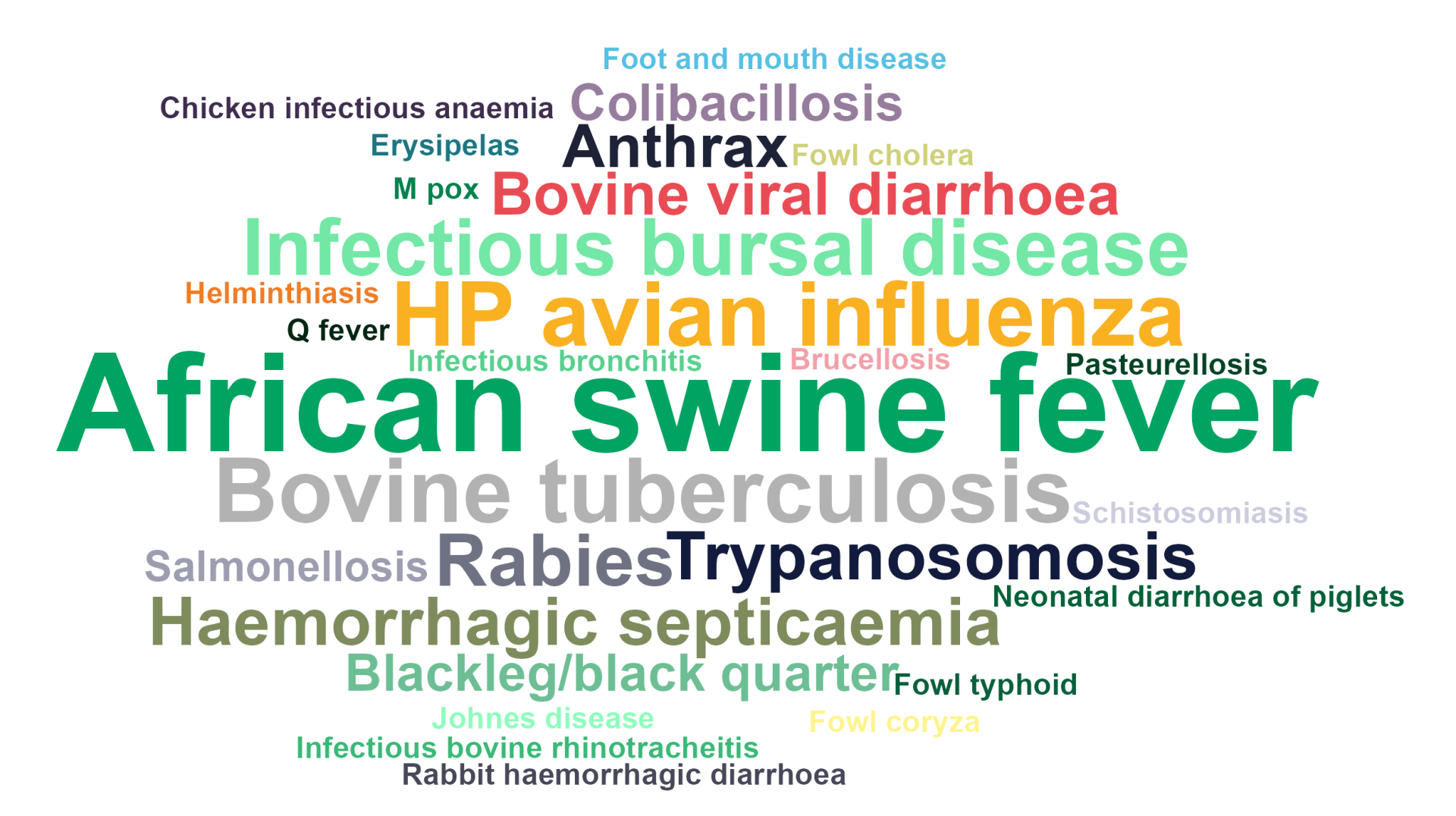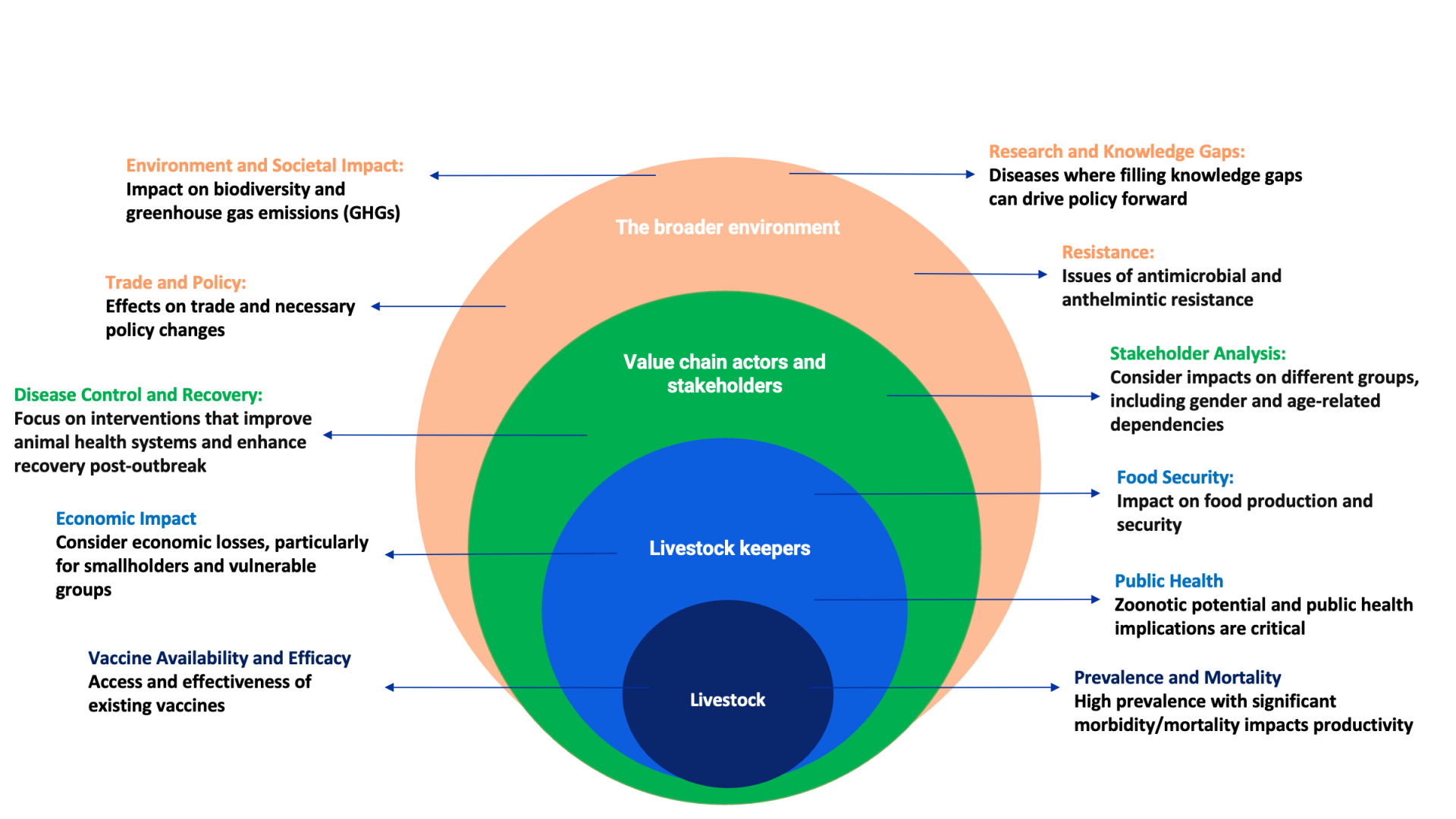Workshop Summary Report: Livestock Disease Evidence Consultation

Photo: GALVmed
Citation
SEBI-Livestock (Supporting Evidence Based Interventions in Livestock) is building an evidence base on livestock disease impacts across Africa and South Asia for 12 priority diseases. This initiative will provide decision-makers with data to prioritise interventions and allocate resources effectively, improving animal health and productivity.
This report summarises findings from a workshop co-hosted with LD4D (Livestock Data for Decisions), which launched a three-week expert consultation to inform the SEBI-Livestock evidence-gathering framework. This report synthesizes the perspectives and insights gathered from 80 participants who took part.
Project information
To learn more about why SEBI-Livestock are building a Livestock Disease Evidence Base, please visit the project website.
Introduction
On 30th June 2025, SEBI-Livestock (Supporting Evidence Based Interventions in Livestock) and LD4D (Livestock Data for Decisions) hosted a kick-off workshop to launch a three-week collaborative consultation (30 June – 19 July) aiming to build an evidence base on livestock disease impacts across Africa and South Asia for 12 diseases and disease groups. These diseases are:
- Brucellosis
- Contagious bovine pleuropneumonia
- Contagious caprine pleuropneumonia
- East Coast fever
- Foot and mouth disease
- Lumpy skin disease
- Newcastle disease
- Peste des petits ruminants
- Rift Valley fever
- Sheep and goat pox
- Common ectoparasites
- Common endoparasites
This initiative will provide livestock decision-makers with an understanding of the data points currently available within the literature. This can support them to prioritise interventions and allocate resources effectively to ultimately improve animal health and productivity. With SEBI-Livestock supported by the LD4D network, we believe we can make an impact together with the international community in this initiative.
Workshop overview
The 90-minute online kick-off workshop was attended by 80 participants (23 female, 57 male) from 26 countries (70% participants based in sub-Saharan Africa, 7% based in South Asia). Participants brought expertise from a range of disciplines and backgrounds, including epidemiology, parasitology, molecular biology, vaccinology, clinical veterinary medicine, library information science, and agricultural ministries. To allow ‘unfiltered’ input, the workshop was not recorded. An icebreaker activity was designed to help participants get to know each other. SEBI-Livestock researchers presented an overview of the project, including aims, objectives and proposed approaches - read more on the project website. This was followed by an interactive session where participants provided written inputs to a series of disease prioritisation questions, using Padlet collaboration boards. The next steps of the consultation process were described before introducing the online collaboration platform, hosted by Open Social. A quick recap and insights on next steps closed the session.
Workshop insights
Through interactive discussions, workshop participants explored how the list of 12 diseases can be prioritised, and participants’ insights were gathered on whether additional high-impact diseases should be included. Participants were also invited to contribute to developing disease prioritisation criteria from diverse regional perspectives, providing input into three structured questions on the collaborative Padlet board. Engagement was high during the interactive session, with participants contributing around 400 valuable insights.
Responses to Discussion Questions
Question 1. Which of the 12 pre-identified diseases do you consider most impactful?
Participants were invited to vote on which diseases they considered most impactful and add a comment explaining why. Figure 1 shows the number of votes per disease and the number of comments received. A higher number of votes indicates strong participant interest in a particular disease.
Figure 1. Number of votes for each disease participants considered most impactful. Summaries of participant comments are viewable when the reader hovers over the contents of the graph.
Question 2. Are there any additional diseases that should be considered?
Participants were invited to propose diseases that should be added to the consultation list. A list of 29 diseases was proposed. This has been visualised as a word cloud in Figure 2. The size of each disease name reflects how frequently it was mentioned, highlighting those that were most commonly suggested.

Figure 2. Word cloud of additional diseases suggested by participants.
Question 3. What criteria would you use for prioritising diseases, or to determine that a disease is a priority disease?
Participants were asked to consider what criteria they would use to prioritise diseases. Key factors to be included in prioritization considerations are shown in Figure 3, which shows comments synthesised into four thematic areas in terms of where the disease impact lay. Comments were not scored in terms of their perceived importance to partcipants.

Figure 3. Summary of participant responses to disease prioritisation criteria, presented across thematic areas.
Conclusion
Overall, participant input was rich and insightful, providing us with valuable thoughts on disease prioritisation and highlighting areas for further consideration. Thank you to all participants who so willingly responded to our call for experts and gave their time and expertise to contribute to the workshop, and the ongoing online discussions.
Next steps
Disease-specific online consultation process
Following the workshop, participants continued the online discussion on the LD4D platform, hosted by Open Social. LD4D facilitators offered onboarding guidance during the workshop and throughout the consultation process. Over three weeks (30 June – 19 July), participants discussed disease-specific questions and exchanged information resources.
Beyond the initial consultation
After the workshop and initial three weeks of active consultation, the SEBI-L research team will finalise systematic map protocols and register these online. The team will then conduct a series of evidence syntheses on the priority diseases. This will involve searching databases and screening articles for relevancy to inclusion and exclusion criteria (determined in the protocols). Relevant data will be extracted from included articles. The protocols and searches will be directly informed by the findings that emerged during the consultation.
Once the findings of the evidence syntheses are available, SEBI-L and LD4D will invite willing experts to review the findings and help ensure all contextual realities are considered.
Following this, the SEBI-L team will develop a series of systematic maps and submit these for journal peer-review.
The SEBI-L team will turn the systematic maps into interactive dashboards, which will display the findings visually and allow users to search and explore the data. These dashboards will be published on livestockdata.org and will be shared with the wider LD4D community.
As well as directly informing the evidence syntheses, the insights gathered during the expert consultations will be summarised in a report (individual inputs will not be identifiable). This report will be shared with participants and the wider LD4D community to highlight the research priorities revealed during the consultation.
Acknowledgments
This report synthesizes the perspectives and insights gathered from 80 participants who took part in a consultative workshop held on 30 June 2025. The following list includes participants who wished to be named.
Tabby Karanja-Lumumba, Chris Silali, Dahlanuddin, Gizachew Gelaw, Elisabeth M. D. L. van der Heijden, Onyekachi Ayevbuomwan, Rob Kelly, William Kuma Adu, Gezahegn Alemayehu Ayalew, Alok Juneja, Madalitso Chelenga, Boma Victor Iriso, Pascal Nyabinwa, Olusola Akinola Ogunsanya, Gathira Muchira, Wilson Charles Wilson, Isaac Olorunshola, Areo Damilola Mercy, Agyemang Kofi Boateng, Elizabeth Anne Jessie Cook, Gladys Taiwo Bilat, Coulibaly Fatoumata, Nick Wheelhouse, Nyamweya Nyakundi Japhet, Soha Sesseya Arnaud Sas, Ameenah Salihu, Brian Perry, Evalyn Njeri Mwarari, Shedrack Festo Bwatota, Mark W. Robinson, Alhassan Maina Abdullahi, Dominique Tshimbalanga, Khang Chol Khang, Lénaïg Halos, Erenius Lochede Nakadio, Alemayehu Regassa, Bukola Olanike Oyebanji, Senen Antiev, Aboubecrine Sow, Joseph Nkamwesiga, Gezahegn Aboset, Kibaya Pius Mwiraria Abori, Theodore J.D. Knight-Jones, Gabriel Mkilema Shirima, Audu Sani, Philip Lomong, Charles D S Chishiri, Khalifa Muhammad Daya, Ritafaith Ugochi Izuora, Abdulhafiz Musa Dabai, Kakha Nadiradze, Robyn G. Alders, Mieghan Bruce, Belay Elias Gemesho, Mahmoud Samir, Aditya Sinha, Chanchal Bhattacharya, Simachew Getaneh Endalamew, Makumi Angela, Simon Holland, Alex Shaw, Musa Mulongo, Andrew Peters, Bemmo Kadjie Sidoine Merveille, Diana Adhiambo Onyango, Frances Siobhan Ryan, Camilla Benfield
Figure credits: Figure 1 and 2 - Isabell Orlishausen (SEBI-Livestock); Figure 3 - Fiona Allan (SEBI-Livestock).
Contact
If you have any questions or comments, please contact SEBI-Livestock: sebi@ed.ac.uk.
Accessibility
If you require this information in another format, please contact SEBI-Livestock: sebi@ed.ac.uk.